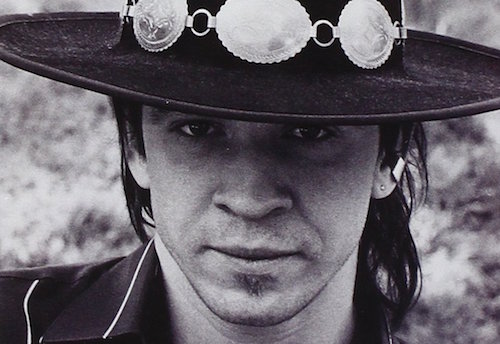
It is a considerable tragedy when any talented musical artist dies at a far-too-young age. But Stevie Ray Vaughan‘s death at 35 years old on August 27, 1990, in a helicopter accident carries notably poignant elements.
A guitar prodigy from his youth in Dallas, Tex., much the same as his older brother Jimmie, Vaughan had toiled for more than a decade in the bars of Austin before being signed by Epic Records in 1983 at the urging of veteran talent scout John Hammond, whose previous discoveries had included Bob Dylan and Bruce Springsteen. One of the bars he played, Antone’s nightclub, had become a regular multi-night stop on the classic blues circuit where both the Vaughan brothers had enjoyed the tutelage and friendship of many of the creators and innovators of modern urban electric blues.
As he stepped into the international spotlight, Vaughan enjoyed the support of Jackson Browne and received impressive initial mainstream rock exposure for his stunning solo on David Bowie’s 1983 #1 single “Let’s Dance” and work on six of the eight tracks on the album of the same name. Over four studio albums, one live LP and extensive touring with his band Double Trouble, Vaughan became rock music’s newest guitar hero, eventually earning gold albums for sales of half a million or more.
 Over the years Vaughan had also acquired substance abuse problems as prodigious as his guitar skills. A severe health crisis in 1986 led him to rehab and a firm commitment to sobriety. But he also “proceeded to defy the old music-business notion that when the truly talented go straight, they sacrifice their creative energy: Stevie became more focused, both as a player and a person,” wrote Joe Nick Patoski, co-author of the 1993 biography Stevie Ray Vaughan: Caught in the Crossfire, in a 1990 Texas Monthly article.
Over the years Vaughan had also acquired substance abuse problems as prodigious as his guitar skills. A severe health crisis in 1986 led him to rehab and a firm commitment to sobriety. But he also “proceeded to defy the old music-business notion that when the truly talented go straight, they sacrifice their creative energy: Stevie became more focused, both as a player and a person,” wrote Joe Nick Patoski, co-author of the 1993 biography Stevie Ray Vaughan: Caught in the Crossfire, in a 1990 Texas Monthly article.
If you’re a new Best Classic Bands reader, we’d be grateful if you would Like our Facebook page and/or bookmark our Home page.
Vaughan recorded both his best album, In Step (1989), which yielded a #1 single “Crossfire” and won a Grammy, and a duet recording with his brother Jimmie – onetime guitarist with The Fabulous Thunderbirds who had embarked on a solo career – Family Style, completed a month before Stevie’s death. All signs pointed to even further artistic achievements in the years to come.
On the evening of August 27, 1990, Vaughan played what was by all reports a triumphant show on a bill with Eric Clapton and his brother Jimmie at Alpine Valley Music Theatre in East Troy, Wisconsin. The helicopter ferrying him away after the gig crashed into a mountainside under dense fog conditions (for which its experienced pilot, who also died, had not been instrument rated to fly in). It was a loss compounded by unfulfilled potential for a now iconic blues-rock guitarist.
Vaughan was born October 3, 1954, in Dallas, where he was raised. He followed his older brother by taking up the guitar at age seven. As a teenager, he was performing in local nightclubs and began devoting all of his time to his craft.
He moved to Austin and joined a band, the Cobras, with whom he continued until 1977, when he formed his own band, Triple Threat Revue. After some personnel changes, the group was renamed Double Trouble.
In 1983, following numerous accolades for his performance on Bowie’s “Let’s Dance,” and several blues awards, Double Trouble released their debut album, Texas Flood.
Related: Our Album Rewind of Texas Flood


4 Comments
Along with Vaughn and the pilot, three other passengers were killed in the crash, including Clapton’s agent Bobby Brooks. He was a wonderful man and an overshadowed loss in this tragic event.
I was in Chicago the week before this tragic accident talking to Buddy Guy at his Legends club. He told me that I should be in Chicago the next week because after that Alpine show they were all going back to his bar to jam the night away. I would have gone back there except that I needed to get back to Detroit, because the Allman Brothers were playing at Pine Knob, they were on their reunion tour and I was putting on a bike show, and they were scheduled to attend the show, not to play, just to lend support for the show.
I’ll never forget the conversation with Buddy, he was as excited as anyone could be to be at the thought of playing with Clapton, and Stevie at his own club.
I was at Alpine Valley that day for that show. SRV played a smoking hot set and Voodo Child Slight Return was the last song in his set. They played an all-star jam at the end with SRV, his brother Jimmie, Robert Cray, Buddy Guy, and Eric Clapton on Sweet Home Chicago. They played the song for about ten minutes and everybody got a guitar solo. When Stevie was done playing his solo Clapton gave him this look that said you’re the best guitar player I’ve ever seen.
I can’t imagine all the greatness yet to come from this amazing talent. I remember the moment I heard he was gone. Just terrible.